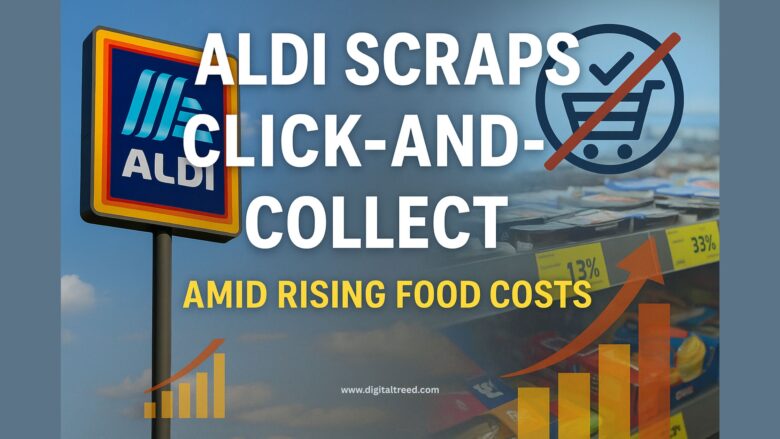Aldi, a supermarket chain, said that it would be ending its popular click-and-collect facility at the close of this week.
This follows after the supermarket suspended its wine and spirit deliveries in January 2023, with its “Specialbuys” also being stopped from being delivered at homes last year.
But, although Aldi remains atop for being the supermarket at the lowest cost, might this most recent store closure be linked with increasing grocery inflation?
Closure of Aldi’s click-and-collect service
Aldi launched its click-and-collect service back in September 2020. However, following its four-year existence, it had to close this service from August 18th.
Though this development would be a blow to customers, a statement from the firm said its click-and-collect had been continually under review and was closed in order to keep prices low for customers.
An Aldi spokesperson said: “We at Aldi are focused on giving our customers excellent quality products at the lowest possible prices. One part of how we are able to keep our prices so low for our customers is by operating the most efficient supermarket business in Britain.
Because of this, we have decided to close our click-and-collect business, so we can focus solely on doing this
Whereas people have complained about this move – from grumbling at losing convenience to worries about elderly and disabled patrons – the business has gradually abandoned its online presence.
Aldi brought its Deliveroo partnership trial to a close in January 2022. It then ended its “Specialbuys” home deliveries a year later, after which came its wine and spirit deliveries a few months later.
Focusing more on its physical stores, the supermarket announced plans to launch four new stores in London by the close of 2024, part of its plans to roll out another 100 stores within the city. The supermarket also announced its future plans to open up to 1,500 stores, with a capital outlay of £550 million.
While Aldi was found to be the UK’s cheapest supermarket by Which?, a supplementary charge of £4.99 had to be paid by customers to get their shopping brought to them at a local click-and-collect store within this service. This is a lot of money in light of the cost-of-living crisis in the UK and increases in grocery shopping bills, not to mention even ‘budget’ food items. Research by a leading think tank, the Institute for Fiscal Studies (IFS), found recent years’ increases were more steep for budget products compared to high-end ones. Britain’s lowest-income homes were most affected by “cheapflation” at the peak of the cost-of-living crisis from 2021-2023. Less affluent families paid 29.1% more for food compared to a rise of 23.5% by wealthier families.
Grocery price inflation rises for first time in 17 months
Aldi’s move follows from a reported rise in the UK’s grocery inflation for the first time since March 2023, citing a data by Kantar, where its rate stood at 1.8% in the four weeks to August 4th from a rate of 1.6% for the last four weeks.
Findings by the Office for National Statistics found items such as cereals, vegetables, fish and bread had fallen in terms of cost. Other foods made more significant contributions, however – namely, single cakes, sliced packaged ham, large chocolate bars and milk.
Fraser McKevitt, our Head of Consumer and Retail Insight, said: “Having trended at a near-three year low in July, in August inflation ticked up slightly.
“Though this can be seen after 17 consecutive months of declining rates, it really reflects a return to averages experienced during the five years leading up to the onset of the cost-of-living crisis.”
But a word of caution comes from the Bank of England, where we are not yet out of the woods yet, with forecasts suggesting inflation will rise to about 2.7% mid-2024, primarily because of increases in the services sector and pay increases throughout the labor market. Catherine Mann, a Monetary Policy Committee member at BOE, said that Britain shouldn’t be “seduced” into believing inflation will remain low throughout the rest of the year.
Aldi’s elimination of its click-and-collect function might have been done with value for money in mind at a time when food inflation had been a problem. However, with irate customers losing out on its convenience factor and data hinting at hikes in its value items, one wonders if this would ultimately be helpful for consumers, or for the brand itself as far as building a customer relationship in the future.

Leave a Reply